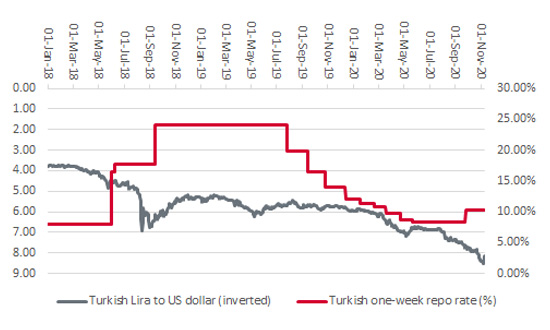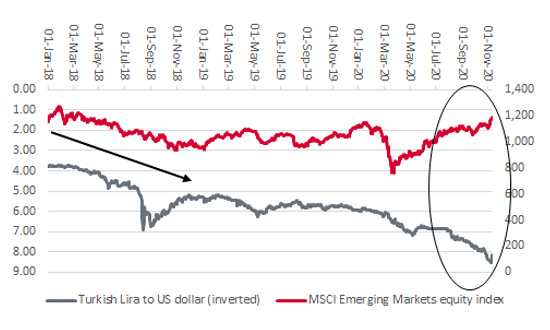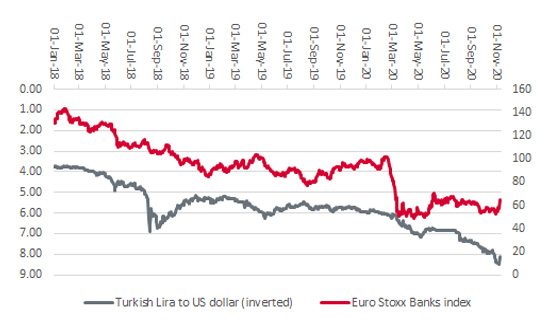


It may seem churlish to worry, given the enthusiastic response the markets are giving to news of the Phase III COVID-19 vaccine trial by Pfizer (PFE:NYSE) and BioNTech, but advisers and clients may need to keep an eye on Turkey once more.
“The Turkish lira is on the slide and Ankara is facing what could yet become its second economic crisis in just three years.”
The Turkish lira is on the slide and Ankara is facing what could yet become its second economic crisis in just three years.
Thankfully the situation is not yet comparable with 2018, when the European Central Bank even warned about the potential risk to those banks which had exposure to the country and the danger that Turkey’s woes could lead to ripple effects throughout the financial system. Europe’s lenders have cut their loan books to Turkey since 2018 and HSBC (HSBA) has even contemplated withdrawing altogether but if there is going to be a fault line that disturbs financial markets’ current calm – as they look to draw strength from fiscal and monetary policy support for Western economies, a Biden win in America and hopes for a vaccine – a good old-fashioned emerging market crisis could just be it.
One Presidential hard man, America’s Donald J. Trump, looks set to fall from office but another, Turkey’s Recep Tayyip Erdoğan, is as powerful as ever, judging by his decision to sack the head of his country’s central bank for the second time in three years.
The removal of Murat Uysal from the post of Governor of the Central Bank of the Republic of Turkey and his replacement by Naci Ağbal is prompting further instability, as finance minister Berat Albayrak – President Erdoğan’s son-in-law, no less – is quitting at the same time, amid reports he and Mr Ağbal do not entirely agree on policy.
The sacking of Mr Uysal came as a surprise in one way, because he had followed the policies which his President seemed to prefer, in the form of dramatic interest rate cuts.
“The Turkish lira has continued to lose ground, weighed down by concerns over political interference and the dreaded combination of substantial current account and budget deficits.”
It was less of a surprise in others, in that the Turkish lira has continued to lose ground, weighed down by concerns over political interference and the dreaded combination of substantial current account and budget deficits. The currency has lost a third of its value in 2020, relative to the dollar, and has halved in the last three years. Such a slump forced the hand of Mr Uysal, who pushed through a two-percentage-point rate hike in September, mirroring the emergency action of his predecessor Murat Çetinkaya in 2018, presumably to the irritation of his President and now former employer.
Turkish lira has fallen sharply again in 2020

Source: Refinitiv data
“The good news is that emerging stock markets are riding through the Turkish turbulence and European banking shares do not look overly troubled, either.”
The good news is that emerging stock markets are riding through the Turkish turbulence, presumably in the view it represents no more than a little local difficulty. This is a welcome contrast to 2018, when angst in Ankara dragged emerging equities lower pretty much across the board.
Emerging markets have yet to show concern about Turkey’s troubles

Source: Refinitiv data
Nor is the European banking sector looking too troubled. This is despite the Bank of International Settlements’ view that Spanish, French, Italian and British banks have €118 billion in loans to Turkish entities on their books, with Spain in for over half of that and the UK (via HSBC) around a tenth.
Instead, banking shares are rising, buoyed by hopes of the return of dividend payments from the FTSE 100’s Big Five lenders in calendar 2021, the prospect of a COVID-19 vaccine and a potential economic recovery that could not only cap loan losses but help to steepen the yield curve and fatten lending margins.
European banking stocks are also shaking off the Turkish lira’s lurch lower

Source: Refinitiv data
Yet advisers and clients must now wait to see what policies Mr Ağbal unveils in his new role as Governor of Turkey’s central bank. Raising interest rates does not seem to be an option, so that leaves four possible courses of action.
“Raising interest rates does not seem to be an option for the Turkish central bank, so that leaves four possible courses of action, the last two of which would be unlikely to sit well with global financial markets.”
Global financial markets would not welcome either of the last two options.
Malaysia imposed capital controls in 1998 and international investors who were stuck with assets stranded in the ringgit sold stocks and bonds in other emerging markets to raise liquidity and protect themselves from the danger of similar moves elsewhere. That eventually rippled around the world and what began as an Asia currency and debt crisis in 1997 became a global one in 1998, and even the FTSE 100 was caught up the melee as it briefly entered a bear market.
None of this is to say that we get a repeat this time, or that Ankara makes the same mistakes as Kuala Lumpur did 22 years ago. But it is a risk that must be watched, especially as markets are at their most vulnerable when they are at their most optimistic.
This area of the website is intended for financial advisers and other financial professionals only. If you are a customer of AJ Bell Investcentre, please click ‘Go to the customer area’ below.
We will remember your preference, so you should only be asked to select the appropriate website once per device.